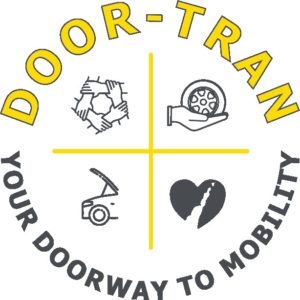Door-Tran Fills the Need for Affordable Transportation Options
- Share
- Tweet
- Pin
- Share
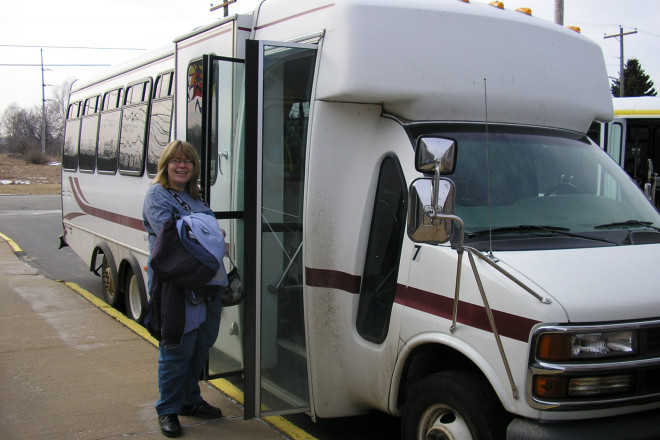
While it may seem, given the number of nonprofit public service organizations on the Door Peninsula, that every need is filled, the fact is that public needs are constantly being redefined. Door-Tran, whose mission statement identifies itself as “a creative community network dedicated to connecting people to transportation services that are affordable, available, and accessible,” is case in point.
The impetus for the creation of Door-Tran began in 2006 when the need for affordable transportation showed up near the top of the list in the United Way of Door County’s annual needs assessment for the second consecutive year. With the need clearly identified, a 40-member steering committee was formed encompassing a wide range of representatives from existing service organizations, private businesses, and government agencies including the Department of Social Services, Department of Veteran’s Services, the United Way, the Senior Resource Center, the County of Door, the Women’s Employment Project, Sunshine House, the Door County Planning Department, representatives of private taxi services, private citizens, and others.
The first objective of the committee was identifying specific needs within the community, which led to a residents study in conjunction with the University of Wisconsin – Green Bay. With funding assistance from the Door County Community Foundation, approximately 13,000 surveys were sent to residents to determine what types of transportation impediments existed, what residents did to overcome these impediments, and what future transportation needs respondents anticipated.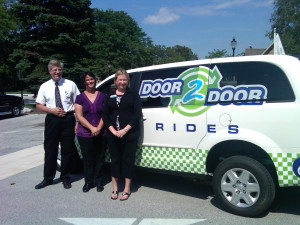
With the survey results in hand, the next step was researching funding options with a key focus on affordability. The steering committee determined that a coupon/voucher program could be funded by the Federal Department of Transportation, funneled through the State of Wisconsin. The only requirement was that federal funds would need a local funding source, which led to Sturgeon Bay’s Raibrook Foundation stepping up to fill the local funding requirement.
With the research done and the funding in place, Door-Tran debuted their half-price voucher program – a partnership with private taxi services in the city of Sturgeon Bay – in 2009. Requirements were kept to a minimum: riders must prove residency (for example, an electric bill showing their name and address) and must register with, and purchase vouchers from, Door-Tran.
Likewise, the program itself is simple. A resident needing transportation services purchases their voucher from Door-Tran, arranges their ride through one of the Sturgeon Bay’s taxi services, and pays for their ride with the voucher. For example, a rider purchases a $10 voucher from Door Tran for just $5. They arrange their ride with the taxi service and give the voucher to the driver as payment for their trip. At the end of each month the taxi services submit their accumulated vouchers to Door-Tran which reimburses them 95 percent of the total vouchers’ value. In other words, if a taxi service submits $100 worth of vouchers at the end of the month, Door-Tran reimburse them $95 with $50 coming from the money riders spent purchasing the vouchers and $45 coming from the funds Door-Tran receives from the funding source mentioned earlier. Door-Tran retains the remaining $5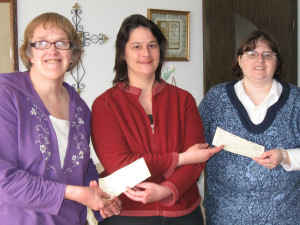 to cover administrative costs.
to cover administrative costs.
In 2010, Door-Tran received recognition as a 501(c)3 nonprofit, which necessitated modifications to the voucher system. According to federal guidelines, riders participating in the program must meet income guidelines.
“Once again, we tried to meet these requirements while being as flexible as the guidelines allow,” comments Pam Busch, Door-Tran Mobility Manager. “Residents who earn less than 200 percent of the Federal Poverty Level are eligible, and we base [eligibility] off income assessment on the preceding three-month period from the time they apply. Once they are approved there is just an annual income review that takes place.”
The voucher program also benefits residents of Washington Island, particularly those whose medical needs require frequent trips to mainland. In this part of the program, island residents can use the vouchers to reduce the cost of the ferry trips.
Door-Tran’s work extends beyond the voucher program. A carpool matching service was actually in place before the voucher system. They also maintain an extensive transportation resource guide that is posted on their website and is constantly being updated. Transportation companies and organizations offering transportation services are provided free listings in the guide.
This past August, Door-Tran was instrumental in starting the Door 2 Door rides program. T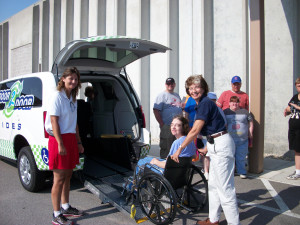 his shared ride service utilizes two wheelchair accessible vans (provided by Abby Vans of Neillsville, a company with over 12 years of experience providing shared rides in communities) that operate within a three-mile radius from the center of Sturgeon Bay (a service map is available on the Door-Tran website). Once again, the cost is remarkably affordable: general passengers pay just $3 per stop while individuals with disabilities, seniors, and children 3 to 18 years of age pay just $1.50 per stop. The service operates weekdays from 6:00 am to 10:00 pm, 7:00 am to 6:00 pm on Saturday, and 7:00 am to 3:00 pm on Sunday (no service is provided on holidays).
his shared ride service utilizes two wheelchair accessible vans (provided by Abby Vans of Neillsville, a company with over 12 years of experience providing shared rides in communities) that operate within a three-mile radius from the center of Sturgeon Bay (a service map is available on the Door-Tran website). Once again, the cost is remarkably affordable: general passengers pay just $3 per stop while individuals with disabilities, seniors, and children 3 to 18 years of age pay just $1.50 per stop. The service operates weekdays from 6:00 am to 10:00 pm, 7:00 am to 6:00 pm on Saturday, and 7:00 am to 3:00 pm on Sunday (no service is provided on holidays).
The project has been well received by the community. “We’re excited to see this project come together,” commented Roger Tepe, Director of Door County Social Services and a member of Door-Tran’s steering committee. “There is so much focus on visitors’ needs here in this county, that it is truly a pleasure to see a project of this magnitude come together for the benefit of the residents.”
Most recently, Door-Tran stepped in to fill the void left after the American Red Cross found it necessary to suspend their transportation services to residents of Door County. This left area veterans without an affordable option for traveling to their appointments as their assigned V.A. medical clinics, which led to discussions between the County of Door, Door-Tran, and Ken Rock, the County Veterans Service Officer.
Creative use of funding, cooperation of various agencies, and the utilization of a donated, wheelchair accessible van to the county’s Senior Resource Center led to the formation of a new Veterans Transportation Program with service beginning on February 3rd of this year and continuing every Thursday throughout the year.
The program provides low cost rides to the Milwaukee and Cleveland V.A. clinics on the first and third Thursdays of each month and to the Gr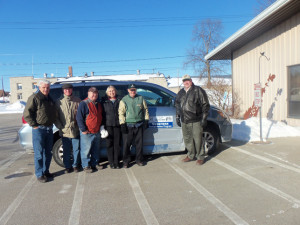 een Bay and Appleton clinics on the second and fourth Thursdays. Door-Tran coordinates the scheduling of both the volunteer drivers and veterans needing rides.
een Bay and Appleton clinics on the second and fourth Thursdays. Door-Tran coordinates the scheduling of both the volunteer drivers and veterans needing rides.
While most of Door-Tran’s work involves the writing of grants and the logistics of scheduling transportation needs, they continue to research ways in which they can expand the range of services and area of coverage.
“While writing grants and filling the needs of our riders consumes much of our time, we are still tracking the community’s needs with an eye toward future plans,” said Busch. “There are still gaps that need to be met, and we are constantly identifying and tracking those gaps so we can explore ways to fill them.”
In this way, and in the programs that it has already implemented, Door-Tran represents a unique, problem-solving partnership between government, community organizations, other nonprofit organizations, private industry, and concerned citizens. Few other organizations bring such a diverse group together to work on a single issue that is, itself, made up of many needs. And when you consider the amount of transportation issues that Door-Tran and its partners have been able to accomplish in just a few short years, it makes their accomplishment that much more remarkable.
Photography courtesy of Door-Tran.

